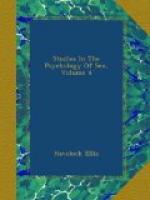[178] “Heredite de la Couleur des Yeux dans l’espece humaine,” Archives des Sciences physiques et naturelles, ser. iii, vol. xii, 1884, p. 109.
[179] Revue Scientifique, Jan., 1891.
[180] F. Galton, Natural Inheritance, p. 85. It may be remarked that while Galton’s tables on page 206 show a slight excess of disparity as regards sexual selection in stature, in regard to eye color they anticipate Karl Pearson’s more extensive data and in marriages of disparity show a decided deficiency of observed over chance results. In English Men of Science (pp. 28-33), also, Galton found that among the parents parity decidedly prevailed over disparity (78 to 31) alike as regards temperament, hair color, and eye color.
[181] Karl Pearson, Phil. Trans. Royal Society, vol. clxxxvii, p. 273, and vol. cxcv, p. 113; Proceedings of the Royal Society, vol. lxvi, p. 28; Grammar of Science, second edition, 1900, pp. 425 et seq.; Biometrika, November, 1903. The last-named periodical also contains a study on “Assortative Mating in Man,” bringing forward evidence to show that, apart from environmental influence, “length of life is a character which is subject to selection;” that is to say, the long-lived tend to marry the long-lived, and the short-lived to marry the short-lived.
[182] For a summary of the evidence on this point see Havelock Ellis, Man and Woman, fourth edition, 1904, pp. 256-264.
[183] “The Comparative Abilities of the Fair and the Dark,” Monthly Review, August, 1901.
[184] The fact that even in Europe the abhorrence to incest is not always strongly felt is brought out by Bloch, Beitraege zur AEtiologie der Psychopathia Sexualis, Teil II, pp. 263 et seq.
[185] Westermarck, History of Marriage, Chapters XIV and XV.
[186] Crawley (The Mystic Rose, p. 446) has pointed out that it is not legitimate to assume the possibility of an “instinct” of this character; instinct has “nothing in its character but a response of function to environment.”
[187] Fromentin, in his largely autobiographic novel Dominique, makes Olivier say: “Julie is my cousin, which is perhaps a reason why she should please me less than anyone else. I have always known her. We have, as it were, slept in the same cradle. There may be people who would be attracted by this almost fraternal relationship. To me the very idea of marrying someone whom I knew as a baby is as absurd as that of coupling two dolls.”
[188] It may well be, as Crawley argues (The Mystic Rose, Chapter XVII), that sexual taboo plays some part among primitive people in preventing incestuous union, as, undoubtedly, training and moral ideas do among civilized peoples.




